Game-Based Learning: Transforming Education Through Play
In today’s rapidly changing educational landscape, board games aren’t just entertainment; they’re educational resources that create natural contexts for language use.
What is Game-Based Learning?
Game-Based Learning (GBL) is an educational approach that leverages the engaging nature of games to facilitate meaningful learning experiences. Unlike traditional teaching methods, GBL creates immersive environments where students actively participate in their education through play.
As our society evolves into what researchers call a “knowledge society,” characterised by rapid technological advancement and changing cognitive processes, education must adapt. Game-Based Learning emerges as a particularly promising response to these challenges.
Why Games Work for Learning
Games naturally engage our minds in ways traditional education often struggles to achieve. When playing games, students experience:
- Intrinsic motivation: Unlike forced educational activities, games invite voluntary participation and sustained engagement.
- The “flow” state: Games can create what psychologist Mihaly Csikszentmihalyi calls “flow” – a state of complete absorption where challenges and skills are perfectly balanced.
- A “magic circle”: Games establish what scholar Johan Huizinga described as a separate space where special rules apply and meaningful learning can occur without real-world consequences.
- Authentic contexts: Games provide realistic scenarios where knowledge isn’t abstract but applied directly to solve problems.
- Progressive challenge: Well-designed games gradually increase in difficulty, keeping students in their optimal learning zone.
- Immediate feedback: Players instantly see the consequences of their decisions, allowing for rapid learning and adjustment.
Beyond Traditional Learning
Game-Based Learning isn’t simply about making education “fun” – it’s about fundamentally transforming how learning happens. When implemented effectively, GBL:
- Develops critical thinking and problem-solving skills
- Encourages collaboration and communication
- Fosters resilience and a healthy approach to failure
- Creates authentic scenarios for applying knowledge
- Builds metacognitive awareness as players reflect on strategies
- Supports the development of social and emotional skills
In language education specifically, board games create natural opportunities for authentic communication, vocabulary acquisition, negotiation skills, and cultural understanding – all in a low-anxiety environment where mistakes become learning opportunities rather than sources of embarrassment.
Implementing Game-Based Learning
Successfully integrating games into education requires thoughtful planning. The game itself isn’t sufficient – it requires a dynamic relationship between teaching and learning, supported by the educator’s expertise in designing meaningful ludic experiences.
Effective Game-Based Learning implementation follows a three-phase structure:
1. Pre-Game Phase
Before introducing the game, teachers prepare students with necessary vocabulary, background knowledge, and clear objectives. This phase builds anticipation while ensuring students have the tools they need to engage meaningfully with the game. Activities might include vocabulary pre-teaching, establishing language goals, or discussing game mechanics.
2. Game Phase
During gameplay itself, the teacher acts as facilitator, monitoring interactions, providing support when needed, and ensuring the learning objectives remain in focus. This is where students experience the “magic circle” of gameplay, engaging naturally with language and content through meaningful interaction rather than forced exercises.
3. Debriefing Phase
Perhaps the most critical phase for educational outcomes, debriefing involves guided reflection on the experience. Through structured discussion, students consolidate learning, identify insights, and connect game experiences to educational objectives. This phase transforms what might otherwise be just a fun activity into a meaningful learning experience with lasting impact.
